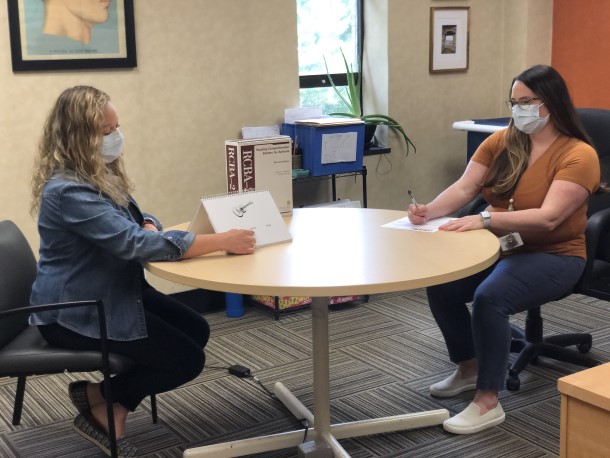
Brain damage due to stroke can cause many physical changes in people. You may think of facial paralysis like the drooping of one side of the face or loss of arm or leg motor functions. People who experience a stroke also can suffer from communication disorders such as aphasia and speech apraxia that disrupt an individuals’ ability to speak and, in some cases, understand conversations.
While both disorders affect communication, they cause different types of impairments. Aphasia can affect speech writing, reading, and listening. People with aphasia may not be able to formulate complete sentences or understand conversations. In contrast, apraxia of speech is a motor disorder that disrupts how the brain sequences the movements that produce speech. While individuals do not have muscular problems, they have difficulty saying words out loud. When speaking, they may take long pauses and struggle to get their mouth into the correct position to make a sound.
What is the difference and how to tell?
Since the symptoms of aphasia and apraxia vary widely among patients and some individuals may experience both neurological disorders simultaneously, diagnosis can be tricky. A variety of standardized tests can help with patient assessment. Clinical knowledge from experienced speech therapists also proves important to differentiate between the two disorders.
“Symptoms in people with aphasia include halting speech, grammar and sentence construction issues, inaccurate word substitutions, and talking with confused speech,” says Kaitlyn Dietz, MS, CCC-SLP, who works as a speech-language pathologist in the Stroke Comprehensive Outpatient (SCOR) Rehab Program at MossRehab Jenkintown. “Apraxia indicators are speech sound errors and distorted sounds.”
Treatments for correcting speech
Speech-language therapy is the primary treatment for both aphasia and apraxia. Dietz uses communication- and impairment-based therapies in her practice. The communication-based therapy focuses on improving communication effectiveness through the use of picture books and communication boards. It also includes structured programs that promote functional verbal communication like script training. Impairment-based treatments focus on the root cause of the problem by stimulating listening, speaking, reading, and other language skills. A therapy session might focus on word retrieval and sound production that help with speech.
Allison Mack, MA, CCC-SLP, who has worked as a speech-language pathologist for nearly ten years in outpatient rehabilitation at MossRehab Jenkintown, uses evidence-based practices in her treatments. “I may use the Oral Reading for Language in Aphasia (ORLA), the Sentence Production Program for Aphasia (SPPA), the Verb Networking Strengthening Treatment for Aphasia (VNeST), Semantic Feature Analysis along with script training when treating individuals with aphasia,” Mack explains. “For patients with apraxia, I am using pacing techniques and sensor cues to help improve motor coordination for speech production.”
Home therapy supplements rehab as individuals continue exercises remotely to progress in their recovery. “I give homework assignments that reinforce the skills gained in therapy,” notes Mack. “Patients also can download a variety of language applications on their devices to practice at home to supplement inpatient therapy.”
Moving towards personal recovery
Speech-language therapy helps patients make significant improvements with language disorders. “The brain is amazing and has the flexibility to find new pathways so patients can communicate better,” notes Dietz. “Even while recovery slows over time, there is never a timeline for improvement as we always can work to help someone communicate better.”
Even when leaving therapy, patients can participate in research studies conducted by Moss Rehabilitation Research Institute (MRRI) on aphasia and apraxia by joining the research registry. MossRehab patients also can meet, socialize, and participate in activities at the MossRehab Aphasia Center located in Elkins Park.
Research on new treatments
MRRI scientists research communication disorders to develop new evidence-based assessment and treatment programs for maximizing recovery. One study, led by Marja-Liisa Mailend, PhD, MRRI scientist and director of the Speech and Language Recovery Lab, focuses on a phenomenon called “speech entrainment” where people with aphasia talk at the same time with another person. “Individuals with aphasia can produce fluent speech when they talk at the same time as another person,” explains Dr. Mailend. “We are researching how we can use this technique as a treatment.”
Sharon M. Antonucci, PhD CCC-SLP, who serves as director of the MossRehab Aphasia Center and the MRRI Research Registry, has studied the value of a semantic feature analysis protocol in group aphasia treatment. This treatment approach cues patients in providing information that describes the word they want to pronounce to improve word-finding abilities. “When a person is challenged in retrieving or producing a word, a clinician provides a cue that prompts the person to describe the word. So, if the word is “pencil”, the clinician might ask the patient to describe and use it. Evidence suggests that this process of thinking helps to activate the word.”
Dr. Antonucci also oversees the People with Aphasia Training Dogs (PATD) program where people with aphasia who are animal lovers can train dogs by attending an obedience course. “Many people with aphasia experience loss of friendships and self-confidence as they have trouble conversing with people,” Antonucci remarks. “Through the PATD program, we look to provide companionship, increase self-confidence and promote community participation by getting individuals out more with their dog.” Initially funded through an Albert Einstein Society Innovative Program grant to run as a clinical activity of the MossRehab Aphasia Center, Dr. Antonucci has received a National Institutes of Health (NIH) research grant to fund a project working with a larger group of participants.
These studies will likely provide more therapeutic options, so clinicians have a bigger toolbox to tailor treatments for people with communication disorders such as aphasia and apraxia.
Check out the MossRehab Stroke Rehabilitation Program, the Aphasia Center and MRRI for resource information and activities for people with aphasia, stroke and their families.